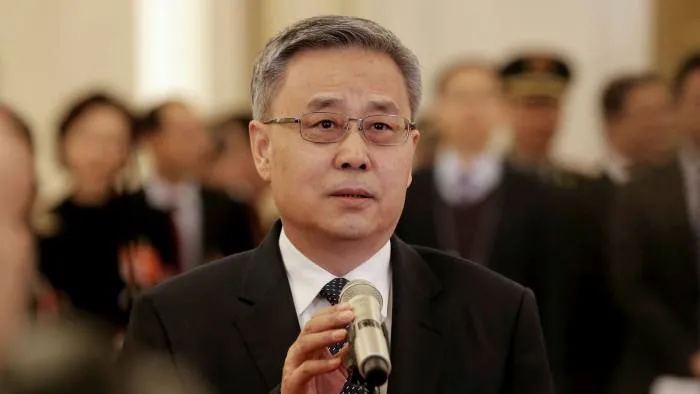
China’s crackdown on Jack Ma’s Ant Group has amplified the power of Guo Shuqing, China’s top banking regulator, who has led the charge against the financial technology group since Beijing halted its $37bn initial public offering in November.
The growing stature of Mr Guo, chairman of the China Banking and Insurance Regulatory Commission, has also piled pressure on the market watchdog that approved the IPO, according to government officials and advisers.
The People’s Bank of China last month tightened its grip on Ant, issuing new draft rules that could force the break-up of the company’s online payment arm on antitrust grounds. The measures were announced hours after Mr Ma appeared in a video posted online — his first public appearance in almost three months.
Ant’s supporters at the China Securities Regulatory Commission have been criticised for allowing the group to dai bing shang shi, or “list despite being ill”. The phrase refers to the regulatory risks associated with the fintech business model that allowed Ant to escape the stricter regulatory scrutiny applied to state-dominated banks.
Officials said Mr Guo has been instrumental in the rollout of the new measures, which have been approved by Xi Jinping, the Chinese president who has long distrusted private sector tycoons as a threat to the Communist party’s grip on power.
“[Ant] wanted to impose its agenda on the government, not the other way round,” said a former official at the PBoC who dealt with the fintech group.
Ant and the central bank previously clashed on issues ranging from the popularity of the group’s flagship Yu’E Bao money market fund, which was once the world’s largest, to its willingness to share the vast trove of credit data it had collected on businesses and individuals.
“President Xi wanted the industry to be regulated,” said one central bank adviser. “Guo helped put the leader’s thoughts into practice.”
The adviser added that the crackdown on Ant had cemented Mr Guo’s status as China’s second most powerful finance official after vice-premier Liu He, one of Mr Xi’s most trusted lieutenants. “Xi, Liu and Guo share a belief that the weaknesses of market economy can be addressed through strong regulation,” the adviser said.
Mr Guo has aspirations to succeed Mr Liu, according to a former PBoC official and two advisers to the central bank. He has led the banking regulator since 2017, is a vice-governor of the PBoC under Yi Gang, the central bank’s governor, and heads the PBoC’s Communist party committee.
He previously ran one of China’s biggest state banks, China Construction Bank, as well as the market regulator and — unusual for a financial technocrat — was governor of Shandong, a large industrial province.
Since returning to the finance arena, Mr Guo has overseen a “regulatory windstorm” that reined in the shadow banking sector, a priority for Mr Liu, whose vast portfolio also includes US and EU trade negotiations and state-owned enterprise reform.
“Liu He is so powerful,” said Chen Long at Plenum, a Beijing-based consultancy. “I don’t think any single person will inherit all of his portfolios.”
Mr Guo has long been a sceptic of China’s internet finance revolution. After joining CBIRC, he led a clampdown on the once-booming peer-to-peer lending industry, which has all but vanished as a result.
At a press conference in 2017, Mr Guo said he had never used a fintech product.
According to Ant’s prospectus, its Alipay payment app is regularly used by 700m people and 80m merchants in China. “They are helpful to the real economy,” Mr Guo said, referring to fintech innovations such as Alipay and Yu’E Bao. “But we must avoid their risks.”
Regulators would not let fintech companies become “too big to fail” or “hinder fair competition and seek excessive profits”, he warned in a speech in December.
CSRC, however, approved Ant’s listing on Shanghai’s Star market less than two months after receiving the company’s IPO application. That compared with waits of more than seven months for other listings on the tech-focused board.
People with knowledge of the matter said the stock regulator wanted to expedite Ant’s IPO approval because the listing would be a symbol of its success in attracting IPOs from China’s tech groups, which have traditionally turned to overseas markets or Hong Kong for funding.
“It is part of CSRC’s mandate to expand China’s influence in the global capital markets,” said Andrew Collier, managing director at Orient Capital Research. “That’s a very different mandate from CBIRC or PBoC.”
The CSRC and CBIRC did not respond to a request for comment.




















